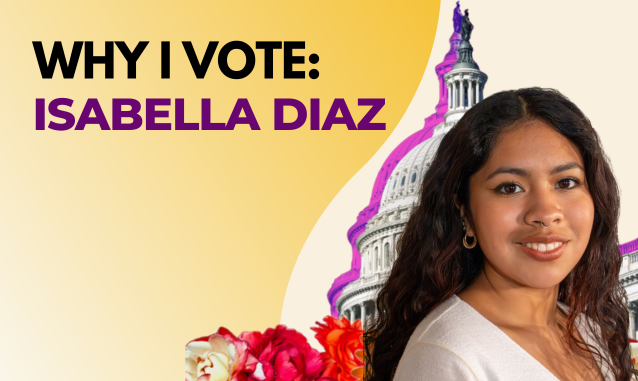
As a Latina first-generation student from New York City, I have had incredible opportunities in my life due to my geographical location. For instance, I was able to:
Become a community organizer for United We Dream (UWD).
Be a part of leadership spaces created for the Latine community.
Learn from Latine peer mentors and faculty.
Feel a greater sense of belonging.
These opportunities have been mine because of my community’s support, love, and hard work. I owe it to my community to give back to them. This is why I fight for our rights at UWD actions, mentor younger Latine peers, and program event spaces for Latine people at my university. These moments are the essence of my identity. The care I receive and give to my community empowers me to do my best to help all Latine people succeed.
As a public health major, I want to help our community be healthier so that more Latine people can have the power to make change. This is why I take charge of learning about issues most impacting my community: the formulation of the Zero Tolerance Policy, diabetes, and health literacy among older people in our community, the effects of health insurance policies, maternal stress, youth obesity rates, etc.
My passion for these issues is inspired by the 1960s Young Lords, a Puerto Rican-led movement concerned with women’s rights and community health. They created sustainable health change by promoting health care, childcare services, and meals for the community. My favorite story is when the Young Lords “liberated” a truck for the barrio when the city refused to do tuberculosis testing. They even took over a hospital for a day in July 1970 to demand a new hospital and preventative health care programs be built in the South Bronx. The Young Lords’ efforts ensure that past, current, and future generations are strong enough to prosper and thrive!
The Young Lords inspire me to continue the legacy of work to make Latine communities healthy. I will continue this legacy through my vote. My vote can help ensure our issues and needs are considered and represented so that our communities can be educated and maintain wellness so that we can continue to grow and thrive as people.
Our community is capable, and so are you. This is why I am voting, and I hope you also use your right to vote.
We aim to track Latina elected officials at all levels of government. If you are a current elected official who identifies as Latina and are not currently listed on our map, please submit your information below. Your submission will be reviewed prior to being added to the map.
Source: National Hispanic Leadership Agenda
The word Hispanic is closely tied to the U.S. government and its efforts to identify groups of people, which defines it as “Americans of Spanish origin or descent.” Under this definition, Hispanic only refers to people who are originally from Spanish-speaking countries. This term includes people from Spain but excludes people from Brazil. Although this term is widely used to describe a pan-ethnic Spanish-speaking group of people, it is not universally embraced by the communities who have been labeled as such. Due to its connection to Spanish colonization, some view the term Hispanic as a Eurocentric label that erases the Indigenous and Afro-Latino heritage of people from Latin America.
The terms Latino, Latina, Latin@, Latine, and Latinx refer to a person or group of people of Latin American or Caribbean origin or descent; this includes people from all countries in Latin America and the Caribbean but excludes Spain. When used in the singular form, Latino refers specifically to a man or boy, which is why it is necessary to use the term Latina when referring to women or girls of Latin American origin. The term “Latino” applies to a broader group of people in Spanish because the language is gendered and the masculine forms of words may also be considered gender-neutral, which means that the language itself sets a baseline that is both heterosexual and masculine and by default exclusionary. The term “Latinx” arose out of a desire to have a gender-neutral term and is used to refer to people of Latin American or Caribbean origins and is inclusive of those who identify along a gender spectrum and diverse sexual orientations and gender identities. Latinx term began appearing on the Internet in queer communities in the United States; however, it is not always considered the perfect response to the search for a postcolonial word because it requires an understanding of the English language and tends to highlight people of mestizo identity while erasing Indigenous and Afro-Latino identities. Some also have used the term “Latin@” to be inclusive, using the @ symbol to represent both an O and an A. More recently, “Latine” has emerged as an alternative to Latinx as a gender-neutral term rooted in the Spanish language. It is starting to be used in some parts of Latin America and the Caribbean and is also starting to gain some recognition in the United States.
ngshgjhrjhtrhthhewthejhfjthejhjhtjhewthewthw